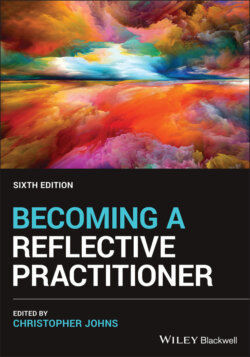Читать книгу Becoming a Reflective Practitioner - Группа авторов - Страница 37
Empowerment
ОглавлениеUnderstanding inevitably changes practitioners. However, acting on understanding may be difficult as noted above or because of a lack of commitment. It may be better to swim in the shallow waves than drown in the rip currents of critical reflection? Yet, once practitioners become aware of realising desirable practice, they are likely to become restless knowing that there are more effective and satisfactory ways to practice.
Shifting barriers that seemingly constrain realising desirable practice can feel like hitting your head against a brick wall – what I term ‘the hard wall of reality’. It can be painful and frustrating and consequently feel it’s not worth tackling. As Smyth (1987, p. 40) notes ‘most of us, unless we feel uncomfortable, shaken, or forced to look at ourselves, are unlikely to change. It is far easier to accept our current conditions and adopt the least line of resistance’. Lieberman (1989, p. 88 – cited by Day 1993) notes that ‘working in bureaucratic settings has taught everyone to be compliant, to be rule‐governed, not to ask questions, seek alternatives or deal with competing values’.
Practitioners need to feel empowered to act. Empowerment is enhanced when practitioners are committed to and take responsibility for their practice, have strong values, and understand why things are as they are. Practitioners may sense they lack agency to formulate and attain their goals. They depict their lives as out of their control, shaped by events beyond their control. Others’ actions determine life outcomes, and the accomplishment or failure to achieve life goals depends on factors they are unable to change. They may view themselves as victims of circumstance. To view self as a victim is to experience a loss of personhood and to project the blame for this loss onto others rather than take responsibility for self. Victims are oriented towards avoiding negative possibilities than to actualising positive possibilities. Bruner (1994, p. 41) notes that persons construct a victimic self by:
Reference to memories of how they responded to the agency of somebody else who had the power to impose his or her will upon them, directly or indirectly by controlling the circumstances in which they are compelled to live.
In theory, reflection would enhance the core ingredients of personal agency, self‐determination, self‐legislation, meaningfulness, purposefulness, confidence, active‐striving, playfulness, and responsibility (Cochran and Laub 1994 cited in Polkingthorne 1996). These qualities are essential to a sense of empowerment. ‘I am not a victim! I have agency! I can assert myself!’ Not easy for the individual working within organisations. Collective action may be necessary to bring about deeper shifts in tradition and authority. And yet it does happen and quite dramatically.
